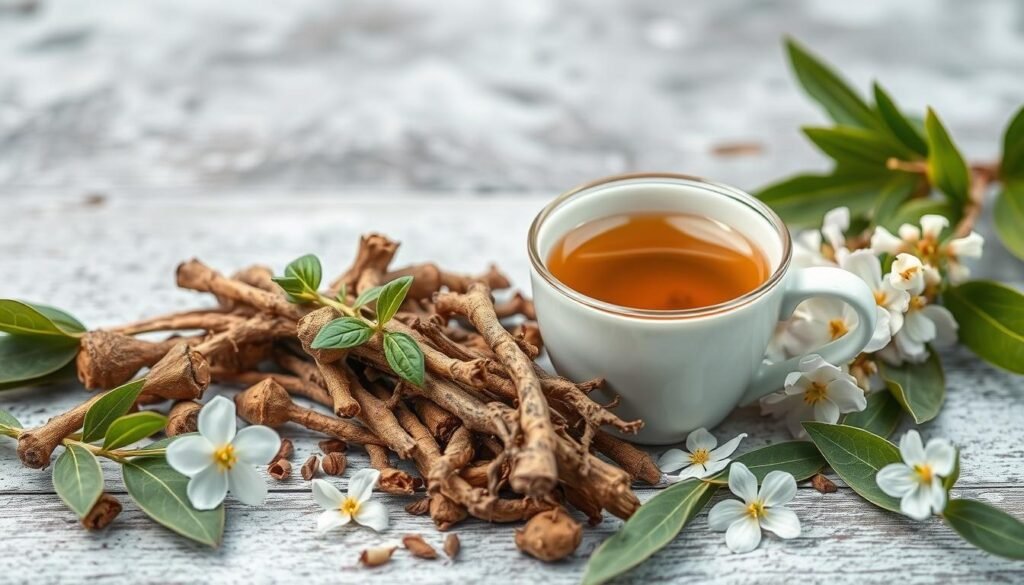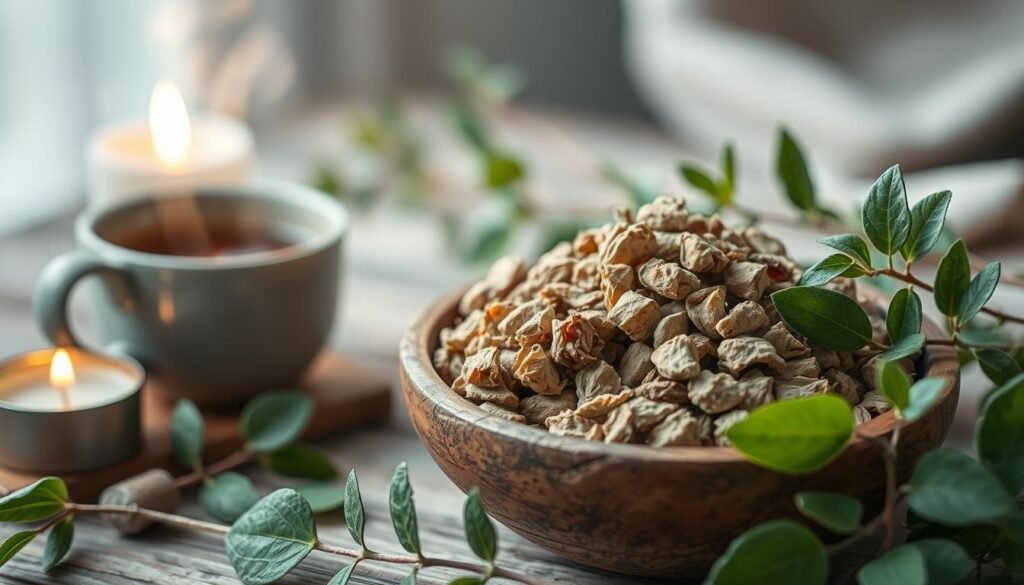Did you know a study in 2021 found valerian root reduced anxiety by 30% in just one month for hemodialysis patients? This ancient herb has helped people relax and sleep better for centuries. Unlike common anxiety meds, valerian root has fewer side effects. We’ll look at its history, compounds, and how it helps with anxiety. You’ll also learn about dosages and what users say about this natural anxiety helper.
Key Takeaways
- Valerian root has been used for centuries as a natural anxiety relief remedy.
- A 2021 study showed significant anxiety reduction in patients using valerian root.
- This calming herb can improve sleep quality and reduce depressive symptoms.
- Valerian root’s active compounds may help regulate GABA levels in the brain.
- It’s available in various forms, making it easy to incorporate into daily routines.
- While generally safe, some users report mild side effects that should be considered.
What is Valerian Root?
Valerian root is known in science as Valeriana officinalis. It’s an ancient herb used for its calming effects. The history of valerian root goes back to ancient Greece and Rome. People have used it for stress and sleeplessness. In the 17th century, it became popular in Europe for treating sleep problems and anxiety.
Origin and Historical Use
Valerian use has ancient roots in medicine. It was important for helping sleep and easing nerves. Records show people have used valerian root for centuries, proving its value in old herbal medicine.
Cultural Significance in Ancient Medicine
Many cultures used Valeriana officinalis for its calming effects. It was a key part of herbal remedies. This shows its long-standing reputation as a safe, natural remedy. There’s a lasting interest in valerian, highlighting its value as a relaxant.
For recent information on valerian, check out this article. It talks about valerian’s benefits for sleep and anxiety.
How Valerian Root May Help with Anxiety
Valerian root is popular for its ability to help with anxiety. Its active ingredients, like valepotriates and valerenic acid, play a key role in mood regulation and relaxation. Learning about these valerian root active ingredients can help us understand their benefits for those with anxiety.
Active Compounds in Valerian Root
Valerian root’s success in easing anxiety is thanks to its active compounds. Valepotriates and valerenic acid help calm the nervous system. Specifically, valerenic acid boosts neurotransmitters essential for mental health. This shows the valerian root active ingredients are crucial for creating peace of mind.
Role of GABA in Anxiety Relief
GABA plays an important role in reducing anxiety. Studies suggest that valerian root may increase GABA levels in the brain, helping to lessen anxiety’s impact. This is important because high GABA levels are linked to lower anxiety and a more relaxed state. The link between GABA and anxiety helps explain why valerian root might be effective in managing anxiety.
In conclusion, valerian root’s ingredients and the role of GABA offer hope to those looking for natural anxiety relief. Considering valerian root, with advice from medical experts, can lead to new ways to handle anxiety naturally. For more information on natural anxiety solutions, check this complete guide.
Benefits of Valerian Root for Anxiety
Valerian root is getting more attention for helping with anxiety. It offers calming effects on the mind, helping manage anxiety better.
Calming Effects on the Nervous System
One top benefit of valerian root is its relaxing effect. It helps lower stress and anxiety. Many people find they feel calmer and less anxious after using it.
Potential to Improve Sleep Quality
Valerian is also great for sleep. Studies show it may make sleep better, especially for those anxious about sleep. Good sleep is key to less anxiety and better stress management.
Users say valerian helps them sleep faster and more soundly. It’s a great part of a bedtime routine.
Scientific Evidence on Valerian Root for Anxiety
Studies on valerian root show mixed results for anxiety relief. Some research points to a decrease in anxiety symptoms, while others see no benefit. This inconsistency highlights the need for more detailed studies.
Clinical Studies and Their Findings
Some people find valerian root helps calm them, reducing anxiety and stress. Evidence from reviews supports these effects in some users. However, not all studies agree, showing why results vary. Combining herbal and traditional therapies often works best for anxiety management.
Limitations of Current Research
Despite its potential, research on valerian root faces challenges. Issues like small study sizes and diverse methods affect the findings. The absence of FDA oversight on herbs also leads to inconsistency in products. More thorough trials are needed to confirm valerian’s benefits and establish proper doses.
Valerian Root Dosage for Anxiety
Knowing the right amount of valerian root to take is key for easing anxiety. The dose needed can change based on the person and the type of valerian root used. This affects how well it works.
Recommended Daily Dosage
For easing anxiety, the usual daily dose is between 120 to 200 mg. This should be taken three times daily. The last dose should be right before bedtime. For sleep problems, a bigger dose, usually 300 to 600 mg, is taken. This should be 30 minutes to 2 hours before going to bed.
Always talk to a doctor before using valerian root. This is crucial if you’re also taking other medications.
Forms of Valerian Root
There are many ways to take valerian root. Each form offers a different way to use it. You can find:
- Capsules: These are simple and straightforward to use.
- Tinctures: This liquid form can be added to water or taken straight.
- Dried Herbal Root: This can be made into tea. Use 2 to 3 grams and steep for 10 to 15 minutes.
Choosing the right form depends on what you prefer and your lifestyle. The type of valerian root you use can change how well it helps with anxiety.
How to Use Valerian Root for Anxiety Relief
Valerian root is a great help for those fighting anxiety. It’s all about finding the best way to use it. There are many ways to include it in your daily life, depending on your needs.
Methods of Consumption
Valerian root comes in different forms:
- Valerian Root Tea: Making tea from the dried root is calming. It lets you enjoy its earthy taste.
- Capsules: Capsules are easy to take with you and give a precise dose.
- Tinctures: This liquid form works quickly and lets you adjust how much you take.
Combining Valerian with Other Natural Remedies
Using valerian with other natural cures can boost its effectiveness. Here are some good partners:
- Chamomile: Chamomile and valerian together help you relax better.
- Lemon Balm: Lemon Balm adds to valerian’s anxiety-reducing powers, improving mood too.
Creating a regular routine with these herbal solutions can improve your anxiety management. Mixing valerian with other herbs could make a big difference in dealing with anxiety.

Potential Side Effects of Valerian Root
Valerian root is known for its calming effects. But, it’s key to know about its side effects for safe use. Some people might feel mild or moderate reactions. Knowing these potential effects helps in making wise health choices.
Commonly Reported Reactions
Common side effects from using valerian include:
- Dizziness
- Headaches
- Gastrointestinal discomfort
- Dry mouth
- Occasional heart palpitations
High doses might cause strange dreams. There are also reports of diarrhea and nausea. Though serious side effects are rare, mixing valerian with alcohol or sedatives requires caution.
Who Should Avoid Valerian Root?
Certain people should steer clear of valerian root:
- Pregnant or breastfeeding women
- Individuals with liver disease
- Young children
- Those taking antidepressants, sedatives, or narcotics
Before using supplements, talking to a healthcare provider is a must, especially for those in these groups or those with ongoing insomnia. It’s important to note that valerian products can vary, so always check the labels closely.
Valerian Root Reviews: What Users Say
Many people have shared their thoughts on valerian root. They talk about how it has helped them feel less anxious and sleep better. These stories underline the calming effects of valerian root. It helps with stress and improves sleep.
Positive Experiences and Success Stories
Valerian root gets a 4.1 out of 5 from users, showing lots of positive feedback. Seventeen users have even given it a perfect score. They mention quicker sleep times, around 30 to 45 minutes, and not waking up during the night.
Some folks have found that combining valerian root with melatonin works well. This mix seems to make their sleep even better.

Critical Feedback and Concerns
Not everyone is happy with valerian root. A few users, four to be exact, gave it just one star due to it not working well. They’ve faced issues like headaches, feeling out of sorts in the morning, and even feeling more restless. This shows that results can vary greatly among users.
It’s clear that using valerian root can be a hit or miss. This highlights why it’s important to try it for yourself and talk to a doctor when thinking about it for stress and sleep problems. Everyone’s body reacts differently, so the approach needs to be personalized.
Available Valerian Root Supplements
Valerian root supplements offer comfort and relaxation. Many brands offer unique formulas to meet everyone’s needs. You can choose from various popular brands and products.
Popular Brands and Products
| Brand | Product | Count | Price | Cost per Capsule |
|---|---|---|---|---|
| Nature’s Truth | Valerian Root Capsules | 90 | $12.99 | $0.14 |
| Nature’s Way | Valerian Vegan Capsules | 90 | $14.99 | $0.17 |
| Botanic Choice | Valerian Root | 120 | $14.99 | $0.12 |
| Botanic Choice | Valerian Root 500mg | 60 | $7.99 | $0.13 |
Think of using valerian root for up to four weeks for wellness. It comes in capsules, powders, and teas. This variety allows you to choose how you take it.
Where to Buy Valerian Root
It’s easy to find valerian root supplements. Look in local health food stores, pharmacies, or online. When buying valerian, make sure to check dosage info and quality stamps. Choosing products tested by outside labs ensures they are both safe and effective.
Integrating Valerian Root into Your Anxiety Management Routine
Adding valerian root to your anxiety plan needs a careful approach. This herb helps improve mental health if used right. It works best when taken daily at the same time.
Creating a Consistent Schedule
It’s crucial to have a routine for valerian root intake. Try to take it 30 to 60 minutes before sleep. Keeping track helps find the best time for its use. This way, valerian is more effective in easing anxiety.
Complementary Lifestyle Changes
Combining valerian root with healthy habits boosts its benefits. You should:
- Regular Exercise: Exercise improves mood and sleep.
- Balanced Diet: Eating well supports mental health.
- Mindfulness Practices: Meditation and yoga help reduce anxiety.
Studies show that valerian root and lifestyle changes work well together for anxiety relief. Looking into other herbal supplements offers extra support.

Conclusion
Valerian root is a natural remedy for anxiety known since Ancient Greece. Some people find its calming effects helpful. It’s seen as a softer, non-addictive alternative to medicines.
One study found no big difference between valerian and a placebo for anxiety. Yet, getting the dose right and watching for side effects is key. The FDA says valerian root is safe to use, and it might help with anxiety and sleep problems.
Adding valerian root to your routine might help you feel more relaxed. Always talk to a doctor before trying something new. With ongoing research, valerian’s role in mental health remains an area of hope.